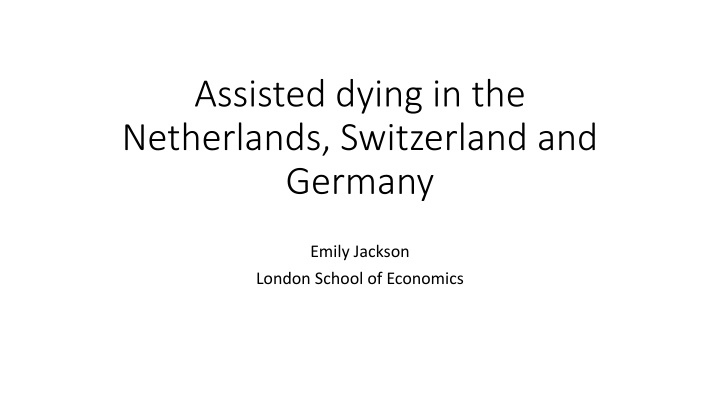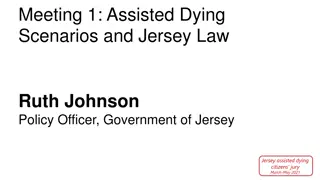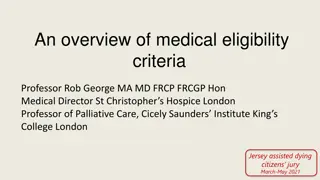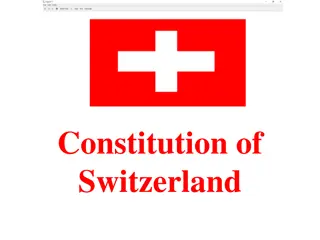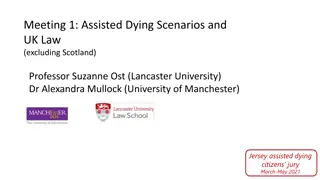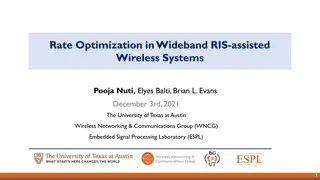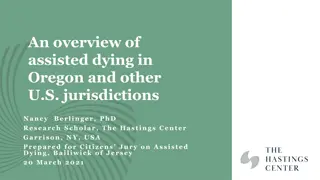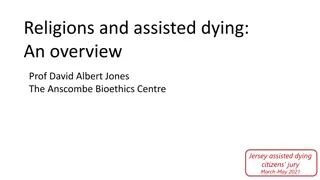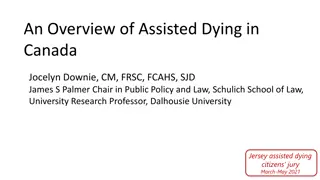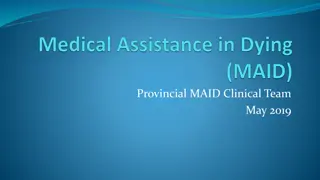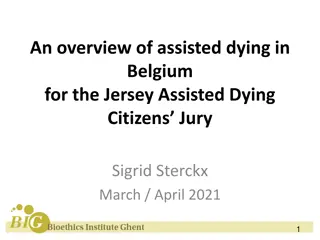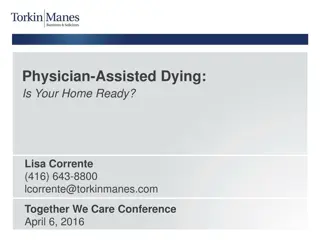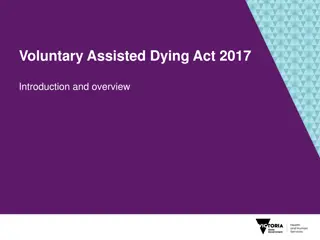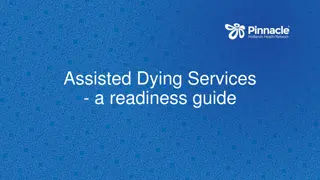Comparison of Assisted Dying Laws in the Netherlands, Switzerland, and Germany
Assisted dying laws in the Netherlands, Switzerland, and Germany vary in terms of legal criteria, processes, and restrictions. In the Netherlands, the Termination of Life on Request and Assisted Suicide Act outlines specific conditions under which euthanasia is allowed. Switzerland permits assisted suicide under certain conditions, with the final action required to be taken by the patient. In Germany, the Federal Constitutional Court ruled against the prohibition of assisted suicide services. Each country has its own approach to addressing end-of-life decisions.
Download Presentation

Please find below an Image/Link to download the presentation.
The content on the website is provided AS IS for your information and personal use only. It may not be sold, licensed, or shared on other websites without obtaining consent from the author.If you encounter any issues during the download, it is possible that the publisher has removed the file from their server.
You are allowed to download the files provided on this website for personal or commercial use, subject to the condition that they are used lawfully. All files are the property of their respective owners.
The content on the website is provided AS IS for your information and personal use only. It may not be sold, licensed, or shared on other websites without obtaining consent from the author.
E N D
Presentation Transcript
Assisted dying in the Netherlands, Switzerland and Germany Emily Jackson London School of Economics
The Netherlands Since the Postma case (1973), the Dutch courts had been developing exceptions to the prohibitions of euthanasia and assisted suicide. The Termination of Life on Request and Assisted Suicide Act 2001: No criminal offence if the due care criteria are fulfilled: Dr must hold the conviction that the request is voluntary and well considered, and that the patient s suffering is lasting and unbearable. Patient must have been informed about his situation and prospects Patient holds the conviction that there is no other reasonable solution At least one independent physician has given his written opinion.
Each case is considered retrospectively by a regional review committee. Public prosecutor is notified if the committee finds that the Dr did not fulfil the due care criteria (12/6585 = 0.18%) Lawful in cases of mental suffering, but very rare (<1%) Lawful in children 12-18 (7 cases in 15 years, most commonly for terminal cancer). Advance euthanasia decisions are possible, but almost never implemented, unless there is also a concurrent competent request.
Switzerland Under Article 115 of the Swiss Penal Code, assisted suicide is a criminal offence only if the motive is selfish. No further legal restrictions Swiss Academy of Medical Sciences requires Drs to check the following preconditions: Patient s disease justifies assumption that approaching the end of life Alternative possibilities for providing assistance have been discussed/implemented. Patient is capable of making the decision, it is well thought out without external pressure and he persists in his wish. Checked by a 3rdperson. Final action must be taken by the patient.
Provided through right to die societies In 2018, EXIT helped a total of 1,204 people end their lives; Dignitas helped 221 people. Dignitas membership is open to non-Swiss nationals. Between 1998-2020, 46% of of the people who had assisted suicides through Dignitas were German citizens, 16% were UK citizens.
Germany February 2020 Judgment of the Second Senate of the Federal Constitutional Court the prohibition of assisted suicide services set out in the Criminal Code violates the Constitution and is void. The right to a self-determined death is not limited to situations defined by external causes like serious or incurable illnesses, nor does it only apply in certain stages of life or illness. Rather, this right is guaranteed in all stages of a person s existence. January 2021 Draft bill introduced to parliament. Requires patient to prove that their wish is permanent and that they have not been forced. Must be a lengthy counselling period to allow for changes of heart.
